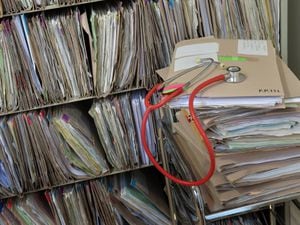Misinformation on GP data sharing scheme ‘could derail system’
Academics said care and research surrounding a range of conditions which are mostly managed by GPs will improve once the data sharing system starts.

Misinformation about the controversial GP data sharing scheme is being perpetuated by a “small but vocal minority” and could potentially “derail” the system, experts have warned.
The project will help to improve the care of patients with many conditions that are managed by GPs, Professor Cathie Sudlow said.
Conditions such as long Covid, dementia, arthritis, heart failure and depression are mainly managed in GP surgeries and research into these ailments is “not as good as it could be” due to current limitations on data sharing, the director of the BHF Data Science Centre at Health Data Research UK added.
Experts said GPs should not be able to opt out their whole practice from the scheme but it should be a decision for patients themselves.
Health minister Jo Churchill told the House of Commons on Tuesday that the General Practice Data for Planning and Research project was due to start in July but its start date has been delayed until September.
It comes after privacy concerns were raised about the project.
However, Prof Sudlow said a “small but vocal minority” of campaigners were behind a “circulation of misinformation about this new and improved primary care data collection”.
Another expert from the UK Biobank research project said the scheme could potentially be “derailed by misinformation”.
Professor Sir Rory Collins, principal investigator and chief executive for the UK Biobank project, added that data on patients in the community “left GP practices years ago”.
GP data is already held by private companies which do not have the same “independent controls and oversight” which exist within NHS Digital, he said.
Meanwhile, people’s concerns about “third party” data access could be misunderstood, experts suggested.
For instance, Oxford University researchers are technically a third party.
Companies like Google would not be able to obtain data for marketing purposes but could potentially be granted permission to access data for research purposes, for example if the tech giant was attempting to develop technology to help patients with diabetes control their condition.
At the moment, around 1.5 million people have indicated they want to opt out of the project.
But some of this may be driven by GPs opting whole practices out of the system.
Asked about GPs who have threatened to remove all their patients from the scheme, Prof Sudlow told a Science Media Centre briefing: “There have been some GP practices who have by default set all of the patients in their practice to opt out.
“I don’t know how much consultation there has been with all the patients in the practice when that has happened and the choice here should be with patients, not with their doctors.”
She added: “The general practice data currently collected by NHS Digital is limited.
“So, health care planning and research to improve care for many people with distressing and disabling conditions managed mainly in primary care is not as good as it could and should be.
“These include conditions like long Covid, dementia, arthritis, heart failure and depression.
“The new improved data collection system will allow better planning and monitoring of health care for all patients in England, and more robust, reliable and rapid research to benefit the public’s health.
“A small but vocal minority of campaigners is behind the circulation of misinformation about this new and improved primary care data collection.”
She added: “There is some unhelpful sensationalist language being used like ‘data grab’ which is , quite frankly, not how these systems work.”
Sir Rory said that half a million Britons had agreed to share their health data with the UK Biobank but many are “astonished” that researchers are unable to access their GP records.
He said: “The addition of GP data could substantially enhance the kind of research that can be done in UK Biobank, for example conditions that typically lead to hospitalisation such as depression, back pain and asthma can be studied.
“Many more cases of diseases can be identified, yielding much more reliable findings, but also allowing us to study disease at an earlier stage before it does lead to hospitalisation.”
He added: “If one reads ‘GPs do not want the data to leave their practice’, I’m afraid that that is a fiction – the GP data left the practices many years ago and it is held by commercial IT system suppliers on behalf of the practices.
“You can actually go along and get approval to do research on those data, you can access the data, you can use it to help you recruit patients into trials, you can use it to do all kinds of research – but without all of the checks and the independent oversight that exists with NHS Digital.
“I’m afraid that the consequences of misinformation are that a very carefully thought through system is being derailed.”
The remarks come as a joint statement from many members of the medical research community, organised by Health Data Research UK, states that “GP health data are crucial for the planning and provision of health services and to enable research discoveries that save and improve people’s lives”.





